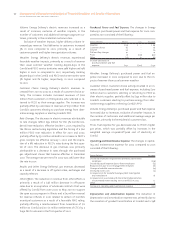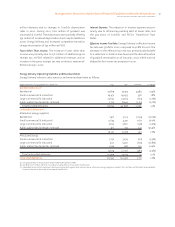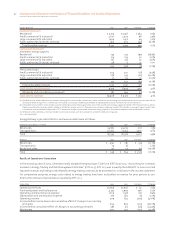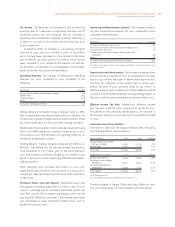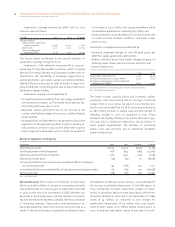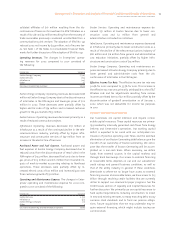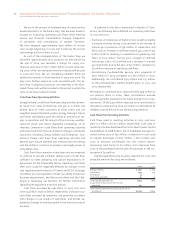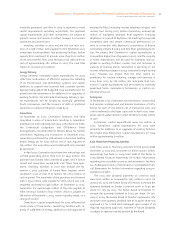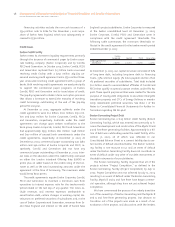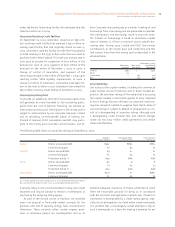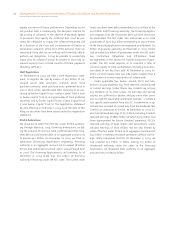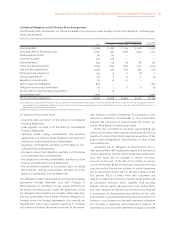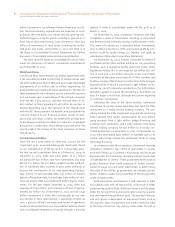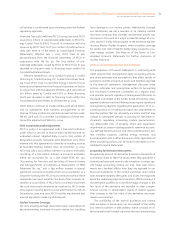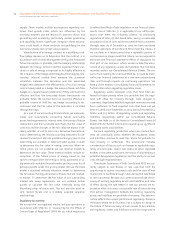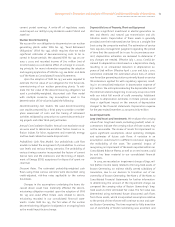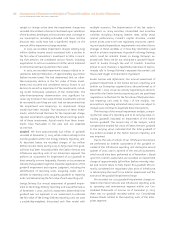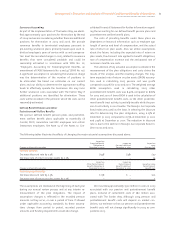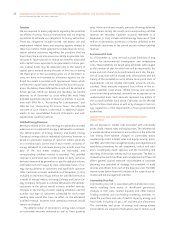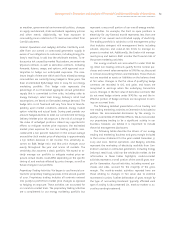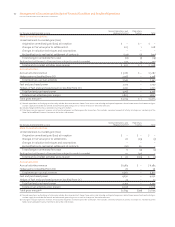ComEd 2003 Annual Report Download - page 62
Download and view the complete annual report
Please find page 62 of the 2003 ComEd annual report below. You can navigate through the pages in the report by either clicking on the pages listed below, or by using the keyword search tool below to find specific information within the annual report.60 Management’s Discussion and Analysis of Financial Condition and Results of Operations
EXELON CORPORATION AND SUBSIDIARY COMPANIES
equate assurance of future performance. Depending on our
net position with a counterparty, the demand could be for
the posting of collateral. In the absence of expressly agreed
to provisions that specify the collateral that must be pro-
vided, the obligation to supply the collateral requested will
be a function of the facts and circumstances of Exelon or
Generation’s situation at the time of the demand. If we can
reasonably claim that we are willing and financially able to
perform our obligations, it may be possible to successfully
argue that no collateral should be posted or that only an
amount equal to two or three months of future payments
should be sufficient.
Shelf Registration
On September 25, 2003, we filed a shelf registration state-
ment, to register the sale by Exelon of $2.0 billion of un-
secured senior debt securities; common stock; stock
purchase contracts; stock purchase units; preferred stock in
one or more series; subordinated debt securities to be pur-
chased by Exelon Capital Trust I, Exelon Capital Trust II and/
or Exelon Capital Trust III; and guarantees of trust preferred
securities sold by Exelon Capital Trust I, Exelon Capital Trust
II, and Exelon Capital Trust III. The registration statement
became effective on February 11, 2004. As of the date of this
filing, no securities have been issued under this registration
statement.
PUHCA Restrictions
We obtained an order from the SEC under PUHCA authoriz-
ing through March 31, 2004, financing transactions, includ-
ing the issuance of common stock, preferred securities, long-
term debt and short-term debt in an aggregate amount not
to exceed $4.0 billion. On December 22, 2003, we filed an
application (Financing Application) requesting financing
authority in an aggregate amount not to exceed $8 billion
for the new authorization period, April 1, 2004 through April
15, 2007. The Financing Application is still pending. As of
December 31, 2003, there was $2.0 billion of financing
authority remaining under the SEC order. The current order
limits our short-term debt outstanding to $3.0 billion of the
$4.0 billion total financing authority. The Financing Applica-
tion requests that the short-term debt sub-limit restriction
be eliminated. The SEC order also authorized us to issue
guarantees of up to $4.5 billion outstanding at any one time.
In the Financing Application, we requested an additional $1.5
billion of guaranty authority. At December 31, 2003, Exelon
had provided $1.9 billion of guarantees under the SEC order.
See Contractual Obligations and Off-Balance Sheet
Arrangements in this section for further discussion of guar-
antees. The SEC order requires us to maintain a ratio of
common equity to total capitalization (including securitiza-
tion debt) of not less than 30%. At December 31, 2003, Ex-
elon’s common equity ratio was 35%. Exelon expects that it
will maintain a common equity ratio of at least 30%.
Under applicable law, Exelon, ComEd, PECO and Gen-
eration can pay dividends only from retained, undistributed
or current earnings. Under Illinois law, ComEd may not pay
any dividend on its stock unless “its earnings and earned
surplus are sufficient to declare and pay same after provi-
sion is made for reasonable and proper reserves,” or unless it
has specific authorization from the ICC. Furthermore, a sig-
nificant loss recorded at ComEd may limit the dividends that
ComEd can distribute to Exelon. At December 31, 2003, Ex-
elon had retained earnings of $2.3 billion, including ComEd’s
retained earnings of $883 million (of which $709 million had
been appropriated for future dividend payments), PECO’s
retained earnings of $546 million and Generation’s undis-
tributed earnings of $602 million. We are also limited by
order of the SEC under PUHCA to an aggregate investment of
$4.0 billion in exempt wholesale generators (EWGs) and for-
eign utility companies (FUCOs). At December 31, 2003, we
had invested $2.5 billion in EWGs, leaving $1.5 billion of
investment authority under the order. In the Financing
Application, we requested EWG authority in an aggregate
amount not to exceed $7 billion.


